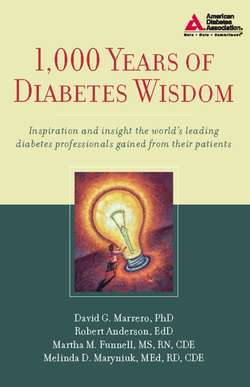Читать книгу 1,000 Years of Diabetes Wisdom - David G. Marrero - Страница 11
На сайте Литреса книга снята с продажи.
Patients Find Their Own Answers
Оглавлениеby Ken Ohashi, physician, Tokyo, Japan
It was quite some time ago that I first learned about the empowerment approach. At that time, I was frustrated with the way I delivered care to people with diabetes. I was not at all confident that what I did was helping them manage their diabetes. I felt my job was to point out my patients’ faults in their self-management of diabetes, even though they were often doing fine.
I was afraid of being accused of not making my patients compliant. For example, when patients refused to take insulin, I tried everything I could think of to persuade them to do what I thought they should do, of course, often in vain. Although the idea of empowerment seemed to be ideal in helping people with chronic diseases, I didn’t know where to start.
Then I met Mrs. Y, who had type 2 diabetes for nearly 25 years. Although she needed insulin for glycemic control, she refused to take it. Se seemed unmotivated, noncompliant, and uninterested in her diabetes. I had done everything to persuade her. I talked about the physiology of insulin, showed the needles and devices for insulin injection, and told stories of possible complications that would occur if she didn’t follow my advice. All of my efforts just went down the drain.
In desperation I asked her, “Well, what would you like to do?” This simple question changed our relationship drastically. She began to talk about how and why she hated insulin and how many efforts she had made to avoid going on insulin. I was amazed at just how fluent and eloquent she was. I realized that my previous assumptions about her were wrong and irrelevant. I learned from her the value of asking patients about their problems and issues.
This revelation relieved me quite a bit. Patients find their own answers. With good questions, we as health care providers can help patients to look inside, know themselves, find their strengths, and recognize their desires and fears. Asking questions is also the best way to stimulate genuine curiosity with our patients.
Now I feel that being with patients is like taking a journey. Their language, foods, and customs sometimes seem strange but that’s the way they live their lives. As a guest, I must respect the differences I encounter. Each encounter with a patient is an opportunity for an exciting journey. My patients, colleagues, friends, and family have all helped me learn the power and value of really listening.
